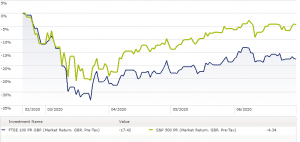Markets have ended the month at a similar level to the start, despite a sell-off in the first few days of June.
The following chart shows the US and UK market since their ‘year high’ on February 20th. The FTSE 100 represents the 100 largest companies in the UK and the S&P 500 represents the 500 largest in the US. The Dow Jones is often quoted but this only shows the top 30 companies and is dominated by technology companies.

In the short-term, news flow will drive market direction and volatility, taking into account new cases of coronavirus, vaccines/treatments, and economic data. Technical factors such as whether markets are overbought or oversold also important over shorter timeframes.
Next year, the global economy is likely to return to trend growth, especially with the prospect of vaccines/better treatments being widely available. There will still be huge stimulus in the financial system in both monetary and fiscal forms, and this will happen at a time of increasing corporate earnings. With a backdrop such as this, it’s unlikely to be a time to be too bearish (negative) on the medium-term prospects for equity markets.
In the longer term, from 2025, threats to valuation levels could emerge in the form of higher inflation, the withdrawal of government backed financial stimulus and less globalisation, but these are not an immediate concern to Markets.
Markets are not factoring in any major problems or setbacks to the economy. Clearly a second wave would cause concern, but this should not be confused with small localised flair ups that have already occurred in some European countries. Many US states eased restrictions at a very early stage compared to countries in both Asia and Europe. President Trump seems to be an advocate of herd immunity and is prepared to tolerate higher case numbers, rather than re-impose restrictions which would be damaging to the economy and his chances of re-election.
Both geo-politics and the US election have the potential to upset markets. Trump has seemingly pulled back from conflict with China, stating that the trade deal remains intact. He is losing ground in opinion polls due to what some would describe as increasingly erratic actions, potentially over fears of an end to his term in office.
The world is enduring the deepest peace time recession in the past 150 years and the distribution of the downturn has not been equal. Countries in the emerging world have suffered more due to inadequate healthcare systems, high density and overcrowding in cities, and a lack of means to put in place a strong enough fiscal response to protect the income of the population. Until the rate of growth of the pandemic slows significantly in these countries, the prospects for emerging markets, including Brazil, Mexico, India and Indonesia, remain poor compared to the developed world. North Asia remains best placed within the emerging world.
In view of the above, I am reviewing the asset allocation within portfolios and will be writing to you over the next few weeks with my recommendations. I anticipate there being some small changes to all the portfolios.
As always, should you have any concerns you wish to raise, please do contact me.
With a lot of businesses now opening their doors, we are working from the office more frequently, though not quite full time. Ali is now in for most mornings, as is Oliver. I am still working from home in order that we can comply with the social distancing rules. We are Covid ‘safe’ and therefore able to see clients in the office.
I hope you are keeping safe and well.

Our Model Portfolio Performance
Click on the link below to see how our model portfolios have performed to date:
Investment Proposition All Charts July20
Harmonic – These are growth portfolios, where your aim for your investment is to achieve growth. Available in risk levels 3 – 8.
Pentatonic – These are income portfolios, where your requirement for your investment is to have a regular income. Available in risk levels 3 – 6.
Melodic – These are our Sustainable & Responsible Investment (SRI) portfolios, also known as Ethical Investing. It is the practice of investing money in companies and funds that have positive social impacts. We offer portfolios which give the investor peace of mind that the companies invested in rate high on an ethical scale, in areas such as environmental. For more information on SRI click here. Available in risk levels 3 – 6
